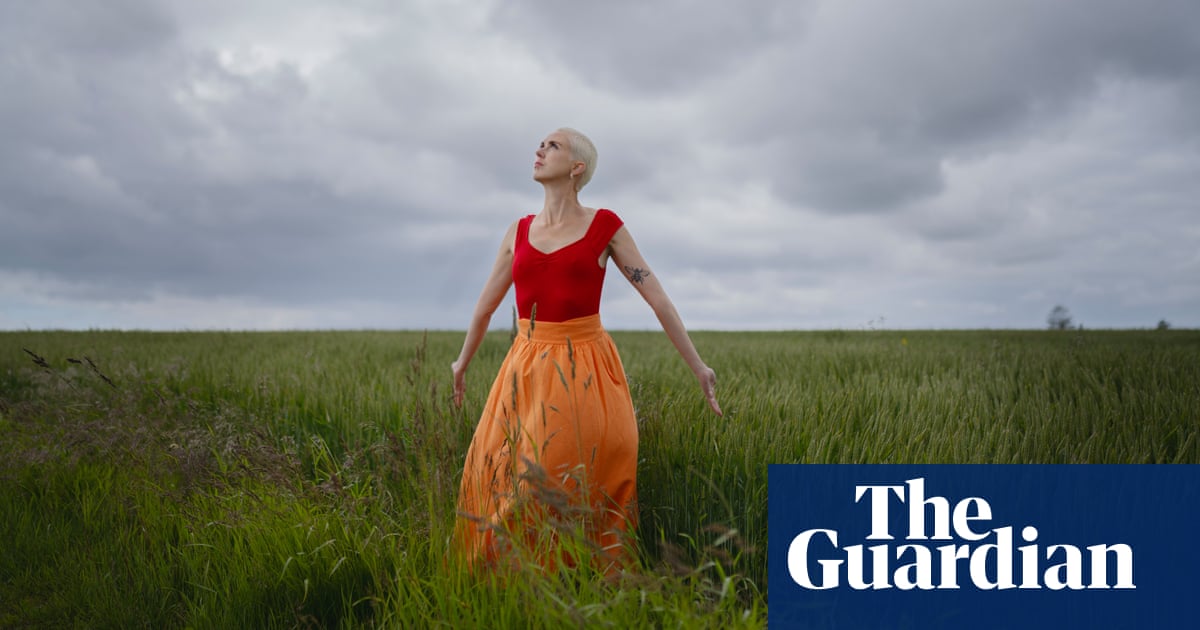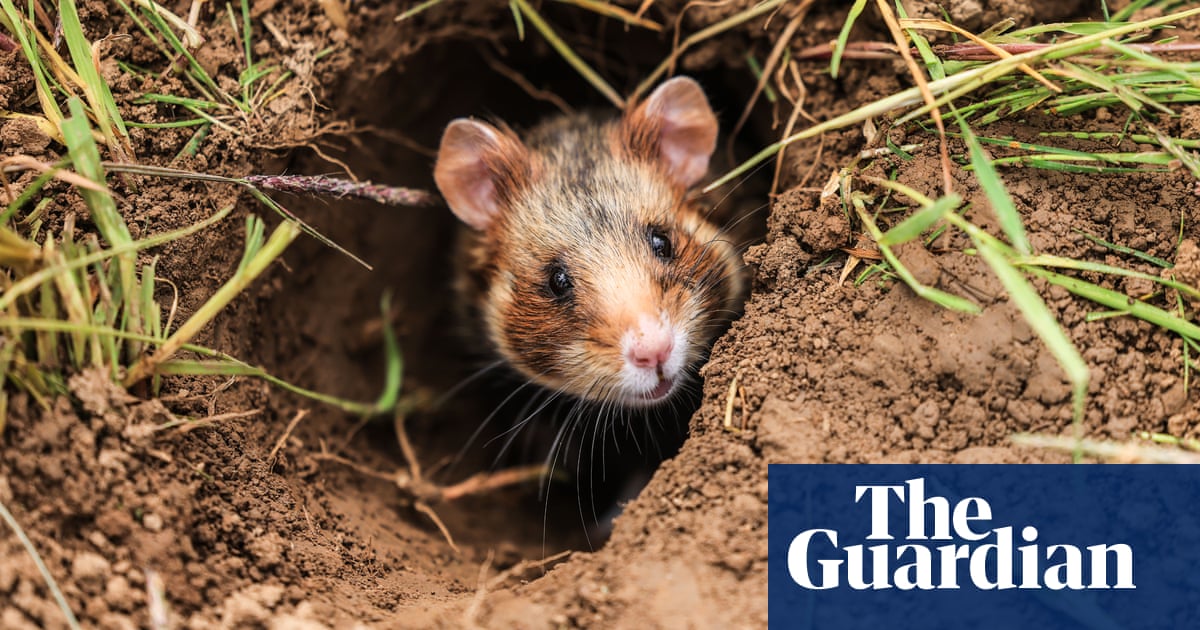My husbandâs death smelled of cardamom. Death smells of many things, but my first memory of it was of cardamom and soft butter buns. It was Sunday morning. I was baking a gingerbread man for our sonâs second birthday. We were celebrating two days in advance â Sunday was better than Tuesday, and the birthday boy was too young to know the difference anyway. My husband was out running a half marathon a bit outside Aarhus, on Denmarkâs east coast, where we lived. He was late as usual, but I was determined not to let it bother me.
Everything was ready. Bunting hung from the living room ceiling, balloons stuck up everywhere. Elmerâs new balance bike was leaning against the wall. The birthday boy was taking a nap before the guests arrived. Soon the apartment would be filled with people, and IÂ enjoyed the quiet moment before the storm.
Then the phone rang.
I picked up and a strangerâs voice asked whether I was Lasseâs wife. I felt an instinctive, nameless fear grip me as I said yes. The stranger was a doctor. Something had happened to my husband. Iâm afraid it is serious, said the voice on the end of the phone. What was he talking about? Lasse had had a heart attack and was in a coma. I interrupted him. No, I said, tentative at first, then shouting. Over and over I shouted, screamed at him. What was he telling me?
The doctor kept his voice calm. He told me that I had to come to the cardiac unit immediately.
I screamed again.
Then I heard Elmer crying from his cot.
A switch inside me flipped. I felt the blood drain from my pounding head, the sweat on my hands turning to ice. Suddenly I was calm. A sharply focused but remote kind of calm. I cleared my throat and said I was ready now; Iâd pulled myself together. I asked what I needed to do.
He told me that I should find someone to watch my son, and then take a taxi to the hospital. We agreed to meet at the entrance to the ward. Before I hung up, IÂ said: âJust so you know, Iâm six months pregnant. Please try to remember that, in case Iâm not able to.â
My husband never woke up. I waited all night, as his family and mine arrived, their faces ashen. The following day he was pronounced dead.
When it was all over, they let me in to see the body. I got on to the bed and lay on my side, facing him, and someone tucked a sheet over us. It billowed around my hip and came to rest motionless over the contours of his body. He didnât look right in that position â he never lay on his back. He had been arranged like that by another stranger, ready for me, for this.
I closed my eyes and whispered: Itâs OK, we can just pretend weâre at home in bed. Soon Elmer will wake up in his cot, and hey, listen, the gulls are squawking outside again â remember last summer when a man came out on to his balcony one morning and shouted at them to fuck off? And we lay laughing in our bed, our eyes still shut?
Our unborn baby was awake again, rolling around inside me, playfully pushing and kicking at his dadâs body. I caressed the little triangle of Lasseâs chest hair like I always did, but it didnât feel the same.
What happened? The doctors couldnât tell me. No one understood why a healthy 27-year-old man would have a heart attack. I was in a state of numb shock, but I couldnât fall apart. I had to go home and tell Elmer that his father had died.
How do you say that to a two-year-old? The hospitalâs grief counsellor told me that death is too abstract for a small child to understand. What he can understand is that Dad isnât coming home again â and then he needs to know where Dad has gone.
So I chose a star.
At home I sat on the bedroom floor with my son. IÂ reminded him that Dad had gone out running and that he had a very long way to go. Yes, he replied, expectantly.
âWell, you know Dad had to run really, really far, and he kept going so long that he ran up into the sky, so high up that he couldnât get down again. Now he is sitting on a star, watching over us. That is where he lives now. He doesnât live with us any more. He will never come back home again.â
As I spoke, I started crying. I thought I might faint. My son looked at me with his big, serious eyes. In my hand I held a photo of my husband. We waved at him together.
Bye-bye, Dad.
The week after Lasseâs death was a blur with shiny glass splinters in it. My apartment was constantly filled with friends and family wanting to give me their condolences. All of them brought flowers. That was when I started resenting flowers, and resenting other people. The thick, sweet smell of lilies made me sick. I jumped every time the doorbell rang; I felt dizzy when I glanced at the pile of shoes in the entrance. I couldnât stand their tears, or the way they looked at Elmer, wanting him to be a source of hope, a ray of light for them in their grief. As if he could carry all that. I wanted them to go away so I could be alone with my child, but as soon as they left I wanted them to come back. Every night I woke up from horrible nightmares to reality hitting me like a hammer: I was a single mother, a 26-year-old widow. In three months I must give birth to a dead manâs child.
A few days before the funeral, I noticed a pain in my abdomen. The closer we drew to the funeral, the more intense the pain became. It felt like a sharp metal hand wrapped around my womb, pulling down hard. Iâd read somewhere that during pregnancy the motherâs and childâs emotions are entwined symbiotically, just like the blood that flows from one to the other. When a mother feels joy, so does her baby â which meant my grief was a poison I was pumping into my son unrelentingly. Could this be acting like an alarm inside my body, triggering the birth? I started panicking. Inside me wasnât a safe place to be right now, but the alternative was not an option: it was far too early for labour. He wasnât ready, and neither was I. I rang the maternity ward.
My mum drove me to the ultrasound clinic for an emergency scan. She held my hand while the doctor pressed the gun to my stomach. Right away, the baby materialised on the screen, yawning his funny little alien mouth and wiping his nose like heâd just woken up from a nap. He tried to stretch his arms and legs, and I felt it: kicks not of grief but of little feet. I burst into tears. Then I laughed. He was alive. So was I. And there was so much to live for.
Lasse and I had met in high school. I was 18 years old, he was 19. We fell deeply, madly in love. He was quirky. I liked that â I was quirky, too. He loved to draw and paint, dreaming of becoming an architect, while IÂ loved reading and writing. After school we went to the same university, moving in together as students. It was only a small studio but we were happy there â the shelves increasingly packed with my books and the architectural models Lasse brought home from school. And when he ran out of shelf space he hung models on the walls, turning them into strange lamps (which was probably very dangerous since they were all extremely flammable, but we didnât worry about that at the time). Years went by and I finished my bachelorâs degree and started a masterâs in journalism. When Lasse proposed, I didnât hesitate. It all felt so romantic. A few weeks before the wedding, I found out I was pregnant, and we were shocked but excited, too. I was 24 years old when Elmer was born â and the honeymoon was over.
I loved the father my husband became, but that process was no walk in the park for either of us. Elmer had colic, screaming for hours on end for the first three months of his life. Neither of us knew what to do and we took it out on each other. I was on maternity leave while Lasse continued his masterâs degree. He often stayed late at school. After he graduated, he got a job at an architectural firm while my own career was swallowed up by motherhood before it had really started. I still dreamed of becoming a journalist, but IÂ wasnât able to separate myself from our child in the way my husband could.
Over time we learned the melody of family life. Elmer grew bigger, he learned to walk and to sleep and to talk. Dad. That was his first word. As he got older, the two of them would play with building blocks for hours, or make colourful drawings together. They connected in a different way than our son did with me â they were interested in the same things. I have a photo of them from our last holiday in Prague. They are looking at the trams, holding hands. For so long they were standing there. What is so fascinating about trams? I could never say.
The same week my husband died, I began writing. The first notes I made were broken, confused. How can I name our baby alone? Do we have insurance? How will I take care of two kids on my own? What colour should I choose for the coffin? Will life ever be good again?
after newsletter promotion
I never imagined these notes would be used for anything â I was just writing as a desperate act of survival. All the things I couldnât say to other people, I would write in the journal. I wrote about my longing for sex. I wrote about the nightmares where Lasse was chasing me, trying to rape me. About the anger I felt towards my mother-in-law. About those evenings when I was too exhausted to say goodnight to the stars with Elmer and instead yelled at him to go to sleep.
And I wrote about Lasse. I missed his kisses, I missed his touch. The smell of his aftershave, the crunchy sound of his espresso boiling in the morning. The way he couldnât pass me when I was cooking without giving my butt a little spank. The way he looked at me while I read to Elmer â he always said I was the best storybook narrator. Glancing out of the window to see him walk past with Elmer on his shoulders, on the way to daycare. His arms around me as we fell asleep.
The happy memories were agony. But there were also good things in the present and I wrote those down, too: the small glimmers of joy when Elmer said something funny or sweet. The warmth from his little body as IÂ held him, the smell of his hair. The evening I put on some music and danced again for the first time. The babyâs kicks; all those firsts still to come. The day Emma, my 19-year-old little sister â my angel, my hero â told me that she would move in to help me with the children.
A few weeks after Emma arrived, I went into labour. Giving birth to my second child was the most beautiful and painful experience in my life. Kaj was born into a circle of women: Emma, two of my best friends and my wonderful midwife. I had asked them not to mention my husband during labour; I couldnât let my grief into that space. I wouldnât be able to stand the pain of the contractions if the grief was also there. But as soon as Kaj was in my arms, we all cried together. He was so perfect. I let my head fall back towards the sky and sobbed. I asked my husband if he could see him â could he see how beautiful his son was? And, surrounded by people who loved me, in that moment I felt so alone. This little boy was mine alone.
When I got home from the hospital, everything became very busy. Kaj screamed day and night, and when he finally fell asleep, Elmer woke up â a constant loop of feedings and tantrums and dirty nappies. Emma tried her best to help, but the boys just cried for me until I came. At the same time, the apartment felt more and more like a museum, a monument to life as it should have been, grief sticking to the walls like dust. My longing for Lasse grew into anger. I started cursing at the night sky: Fuck you, Lasse! How dare you abandon me! Fuck you and your fucking star!
But slowly, very slowly, things got better. The children grew. The nights got quieter and the days got brighter. When Emma eventually moved out, I decided that it was time for me to look for a new place, too. I found a sweet little house for me and the boys in a village-like corner of Aarhus.
We landed in a simple everyday, a little life. Full of routines and meaning, the number of good days on the rise.
The boys played in the bathtub in the evenings and I sat with them, reading a book with rolled-up trousers and my feet submerged in the warm water. We watched TV, we lit candles on overcast mornings, we argued, they fought, I did the laundry and finished my masterâs degree, Kaj learned to walk and chase spiders, I laid out clothes for the next day in three little piles, Elmer started drawing, I wrote a poem about getting on a bus and falling in love, we turned the music up and danced after dinner again. I baked buns at weekends. Sometimes we waved goodnight to Dad on the star, but most of the time we didnât.
Lasse faded.
I could no longer recall his face every time I shut my eyes. I had to conjure up a particular detail first â his Adamâs apple, his wonky front tooth â in order to put the rest of the puzzle pieces together and make him whole again. And yet he still managed to find a way to appear, in all his clarity, just when I hadnât called for him.
When Elmer pursed his lips in concentration, there he was.
When I warmed Kajâs feet in my hands, it was like holding tiny versions of Lasseâs, with their funny high arches and toes scrunched up like they were cracking a nut.
But the Lasse who lived inside me was finally coming to rest.
It seemed like we made it through the storm.
I kept it together for six years. Then I collapsed. Suddenly I was unable to do anything. I cried at the complexity of setting a breakfast table. I yelled at the kids over nothing. I started having nightmares about dead bodies. Sometimes I dreamed that Lasse was chasing me and the kids around a house where none of the windows or doors opened. I quit my job and started therapy, but it didnât really help.
Thatâs when I decided I had to go back to the grief, to remember the truth of those brutal, lonely days, to write the story properly. I had to take myself to the bottom of my own sea. The first time I opened up the dusty box of notebooks, I was very scared â what if the sorrow and darkness took over completely? What if I went down there and I couldnât get back up to the surface?
As I read back through the muddled, grief-stricken notes, I noticed how hard I was on myself. I felt guilty for crying in front of Elmer. I felt guilty for not grieving hard enough. I felt guilty for being happy (unless it was because of the children).
A few weeks before giving birth I wrote this note: âI havenât had my picture taken since Lasse died. I donât feel like this is a moment in my life that should be captured. How should I look at the camera? Should I smile? Thatâs a bit misleading, isnât it? Should I cry, then? Portraying myself as a fucking victim, self-absorbed, dwelling in sorrow? But what about the baby? I owe it to him to have a picture of âhisâ belly. In the future he should be able to look at it and see how tremendously happy I was to have him. That I feel so lucky to be gifted with all this love!â
But as I read I also started to notice how my notes dwelt on moments of grace â how I had used them to capture all the beauty that still remained in the world. In the midst of my loss, I had been writing about death only to write about life: which is so persistent and so beautiful.
Once I got started, the writing was incredibly liberating. I was in charge of the story this time, not the other way around. I closed my eyes and I went back to the hospital. I saw the dead body again. This time I stayed until Lasse didnât scare me any more. I went back and told Elmer about the stars. I held Kaj in my arms for the first time again. And I told myself how great I did. How wonderful the boys turned out to be. That it was all worth it.



